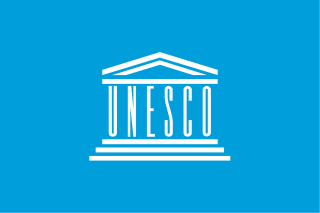
The University for Peace (UPEACE) is an international graduate-only university and intergovernmental organization. The university was established as a treaty organisation by the United Nations General Assembly in 1980.

Seán MacBride was an Irish Clann na Poblachta politician who served as Minister for External Affairs from 1948 to 1951, Leader of Clann na Poblachta from 1946 to 1965 and Chief of Staff of the IRA from 1936 to 1937. He served as a Teachta Dála (TD) from 1947 to 1957.

Reporters Without Borders is an international non-profit and non-governmental organization with the stated aim of safeguarding the right to freedom of information. It describes its advocacy as founded on the belief that everyone requires access to the news and information, in line with Article 19 of the Universal Declaration of Human Rights that recognizes the right to receive and share information regardless of frontiers, along with other international rights charters. RSF has consultative status at the United Nations, UNESCO, the Council of Europe, and the International Organisation of the Francophonie.

Freedom of information is freedom of a person or people to publish and consume information. Access to information is the ability for an individual to seek, receive and impart information effectively. This sometimes includes "scientific, indigenous, and traditional knowledge; freedom of information, building of open knowledge resources, including open Internet and open standards, and open access and availability of data; preservation of digital heritage; respect for cultural and linguistic diversity, such as fostering access to local content in accessible languages; quality education for all, including lifelong and e-learning; diffusion of new media and information literacy and skills, and social inclusion online, including addressing inequalities based on skills, education, gender, age, race, ethnicity, and accessibility by those with disabilities; and the development of connectivity and affordable ICTs, including mobile, the Internet, and broadband infrastructures".

The World Association of Community Radio Broadcasters is the international umbrella organization of community radio broadcasters founded in 1983, with nearly 3,000 members in 110 countries. Its mission is to support and contribute to the development of community and participatory radio along the principles of solidarity and international cooperation.
The New World Information and Communication Order is a term coined in a debate over media representations of the developing world in UNESCO in the late 1970s early 1980s. The NWICO movement was part of a broader effort to formally tackle global economic inequality that was viewed as a legacy of imperialism upon the global south.

An Phoblacht is a formerly weekly, and currently monthly newspaper published by Sinn Féin in Ireland. From early 2018 onwards, An Phoblacht has moved to a magazine format while remaining an online news platform. Editorially the paper takes a left-wing, Irish republican position and was supportive of the Northern Ireland peace process. Along with covering Irish political and trade union issues the newspaper frequently featured interviews with celebrities, musicians, artists, intellectuals and international activists. The paper sells an average of up to 15,000 copies every week. During the 1981 Irish hunger strike its sales soared to over 70,000 per week.

Amadou-Mahtar M'Bow, GCIH is a Senegalese retired civil servant and former Director-General of UNESCO. Born in Dakar, M'bow served in France and North Africa during World War II after volunteering for the French Army, also serving with the Free French, and finally in the French Air Force. After the end of the war, he studied geography at the Sorbonne University in Paris. He served at UNESCO Headquarters in Paris from 1953 to 1987.

The International Peace Bureau, founded in 1891, is one of the world's oldest international peace federations. The organisation was awarded the Nobel Peace Prize in 1910 for acting "as a link between the peace societies of the various countries". In 1913, Henri La Fontaine was also awarded the Prize "[For his work as] head of the International Peace Bureau". As of 2012, eleven other Nobel Peace Prize laureates have been members of the IPB.
Source protection, sometimes also referred to as source confidentiality or in the U.S. as the reporter's privilege, is a right accorded to journalists under the laws of many countries, as well as under international law. It prohibits authorities, including the courts, from compelling a journalist to reveal the identity of an anonymous source for a story. The right is based on a recognition that without a strong guarantee of anonymity, many would be deterred from coming forward and sharing information of public interests with journalists.

The International Programme for the Development of Communication is a United Nations Educational, Scientific and Cultural Organization (UNESCO) programme aimed at strengthening the development of mass media in developing countries.
In mass communication, media are the communication outlets or tools used to store and deliver information or data. The term refers to components of the mass media communications industry, such as print media, publishing, the news media, photography, cinema, broadcasting, digital media, and advertising.
The Non-Aligned News Agencies Pool (NANAP) was a cooperation system among news agencies of Non-Aligned countries, which lasted from 1975 to mid-1990s. The NANAP was initially led, funded, and supported by Yugoslavia's Tanjug, and gathered many state-owned news organizations, especially in Africa and Southern Asia. 26 news organizations joined the pool within the first year since the establishment.

The United Nations Educational, Scientific and Cultural Organization (UNESCO) is a specialized agency of the United Nations (UN) aimed at promoting world peace and security through international cooperation in education, arts, sciences and culture. It has 193 member states and 12 associate members, as well as partners in the non-governmental, intergovernmental and private sector. Headquartered in Paris, France, UNESCO has 53 regional field offices and 199 national commissions that facilitate its global mandate.
Communication rights involve freedom of opinion and expression, democratic media governance, media ownership and media control, participation in one's own culture, linguistic rights, rights to education, privacy, assemble, and self-determination. They are also related inclusion and exclusion, quality and accessibility to means of communication.

Frank La Rue is a Guatemalan labor and human rights law expert and served as UN Special Rapporteur on the Promotion and Protection of the Right to Freedom of Opinion and Expression, from August 2008 to August 2014. Along with American Human Rights attorneys, Anna Gallagher and Wallie Mason, Mr. La Rue is the founder of the Center for Legal Action for Human Rights (CALDH) and has been involved in the promotion of human rights for over 25 years. He was nominated for the 2004 Nobel Peace Prize by Mairead Corrigan, Northern Irish peace activist and 1976 laureate. Mr La Rue was previously the executive director of Robert F. Kennedy Human Rights Europe. He has also served as Assistant Director-General for Communication and Information at UNESCO.
Most Azerbaijanis receive their information from mainstream television, which is unswervingly pro-government and under strict government control. According to a 2012 report of the NGO "Institute for Reporters’ Freedom and Safety (IRFS)" Azerbaijani citizens are unable to access objective and reliable news on human rights issues relevant to Azerbaijan and the population is under-informed about matters of public interest.
The Iranian National Commission for UNESCO was established in 1948 subsequent to Iran’s accession to UNESCO, by the order of the National Consultative Assembly, the then Parliament of Iran. To depict its objectives, terms of reference and main operating bodies, the constitution of the Iranian National Commission for UNESCO was drafted in 13 articles and later adopted in the meeting of the Cabinet in 1949, by the proposal of the then Minister of Culture.
Internet universality is a concept and framework adopted by UNESCO in 2015 to summarize their positions on the Internet. The concept recognizes that "the Internet is much more than infrastructure and applications, it is a network of economic and social interactions and relationships, which has the potential to enable human rights, empower individuals and communities, and facilitate sustainable development. The concept is based on four principles stressing the Internet should be human rights-based, open, accessible, and based on the multistakeholder participation. These have been abbreviated as the R-O-A-M principles. Understanding the Internet in this way helps to draw together different facets of Internet development, concerned with technology and public policy, rights and development."

Safety of journalists is the ability for journalists and media professionals to receive, produce and share information without facing physical or moral threats.











